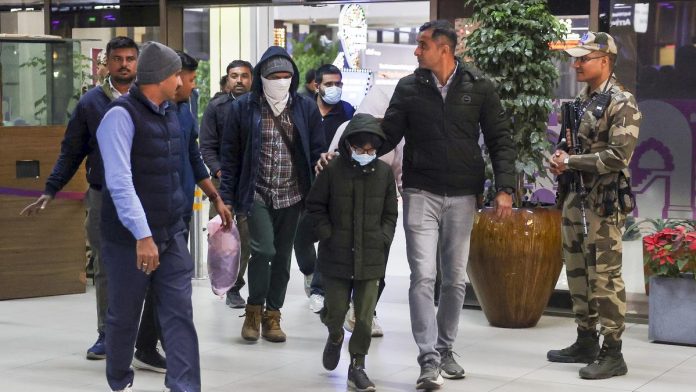A US military aircraft carrying the third batch of 112 Indian deportees landed at Sri Guru Ram Dass Jee International Airport in Amritsar on Monday morning. This development has once again brought the spotlight on illegal immigration and the increasing challenges faced by Indian nationals seeking unauthorized entry into foreign countries, particularly the United States.
Details of the Arrival
According to official reports, the deportees were brought back as part of a collaborative effort between Indian and US immigration authorities. The flight, which arrived around 7:30 AM, included individuals who were detained by US authorities for entering the country illegally through various routes, including the US-Mexico border.
District Commissioner of Amritsar, Ghanshyam Thori, confirmed the arrival and stated, “We have ensured all necessary arrangements for their smooth immigration process, including medical check-ups and documentation.”
The Journey of the Deportees
The deportees, primarily from Punjab, Gujarat, and Haryana, had embarked on perilous journeys in hopes of securing better economic prospects abroad. Many paid hefty sums to human traffickers, often referred to as “agents,” who promised safe passage into the US but left them stranded in harsh conditions.
One deportee, who wished to remain anonymous, shared his experience:
“I paid ₹25 lakh to an agent who assured me a secure job in the US. Instead, I was caught at the Mexico border and kept in detention for four months.”
The Growing Trend of Illegal Immigration
The return of these deportees highlights a concerning rise in illegal immigration attempts by Indian nationals. Over the past year, US authorities have deported more than 300 Indians, with most belonging to Punjab, a state significantly affected by human trafficking networks.
Key factors driving this trend include:
- Economic Challenges: Limited job opportunities in local markets.
- Misleading Agents: False promises of high-paying jobs abroad.
- Family Pressure: Social pressure to achieve a higher standard of living through overseas employment.
Government’s Response and Preventive Measures
In response to the growing issue, the Indian government has intensified its crackdown on human trafficking networks. Special task forces have been formed to track and apprehend agents involved in these illegal activities.
Punjab Police, in collaboration with central agencies, recently arrested several individuals accused of running international immigration rackets. Additionally, awareness programs have been launched to educate the youth about the legal and safe avenues for immigration.
“We are committed to curbing illegal immigration and protecting our citizens from exploitation,” said a senior official from the Ministry of External Affairs.
Human Cost of Illegal Immigration
Illegal immigration is not just a legal issue but also a humanitarian crisis. Many deportees narrate horrifying experiences of exploitation, starvation, and violence during their journey.
Some common hardships faced include:
- Exploitation by Traffickers: Financial and physical abuse.
- Dangerous Routes: Crossing deserts and rivers in extreme weather.
- Detention Trauma: Long periods of isolation in foreign detention centers.
One deportee, 28-year-old Rajdeep Singh from Jalandhar, recounted his ordeal:
“We were crammed into a truck with 40 others, with no food or water for days. I regret my decision every day.”
Economic Impact on Punjab
Punjab has witnessed a notable economic and social impact due to the mass exodus of its youth seeking foreign jobs. Experts warn that this trend could lead to a severe workforce shortage in various local industries.
Dr. Amanpreet Kaur, a sociologist from Panjab University, explained:
“The glamorization of foreign jobs has deeply influenced young minds. Community-driven initiatives are essential to reverse this mindset.”
US Immigration Policies and Indian Deportations
The US government has tightened its immigration policies in recent years, leading to a surge in deportations. Enhanced border security and stricter visa regulations have made illegal entry more difficult.
According to the US Customs and Border Protection, over 2,000 Indian nationals were detained at the Mexico border in 2024 alone. The ongoing collaboration between US and Indian authorities is expected to continue, with more deportations anticipated in the coming months.
International Cooperation on Immigration
India has been actively working with countries like the US, Canada, and Mexico to address human trafficking and illegal immigration. Regular bilateral meetings and information-sharing protocols have been established to track and dismantle trafficking networks.
Community Reactions
The arrival of the deportees has sparked mixed reactions in Punjab. While families are relieved to have their loved ones back, concerns about future job prospects and societal stigma persist.
Local residents and social organizations have urged the government to provide counseling and employment opportunities for the returnees to facilitate their reintegration into society.
Mrs. Gurpreet Kaur, a social worker from Amritsar, stated:
“These young men and women are victims, not criminals. We must support them rather than ostracize them.”
The arrival of the third batch of Indian deportees in Amritsar is a stark reminder of the challenges surrounding illegal immigration. While the government continues its efforts to curb such activities, a collective societal response is essential to address the root causes driving youth toward dangerous migration paths.
By – Nikita




